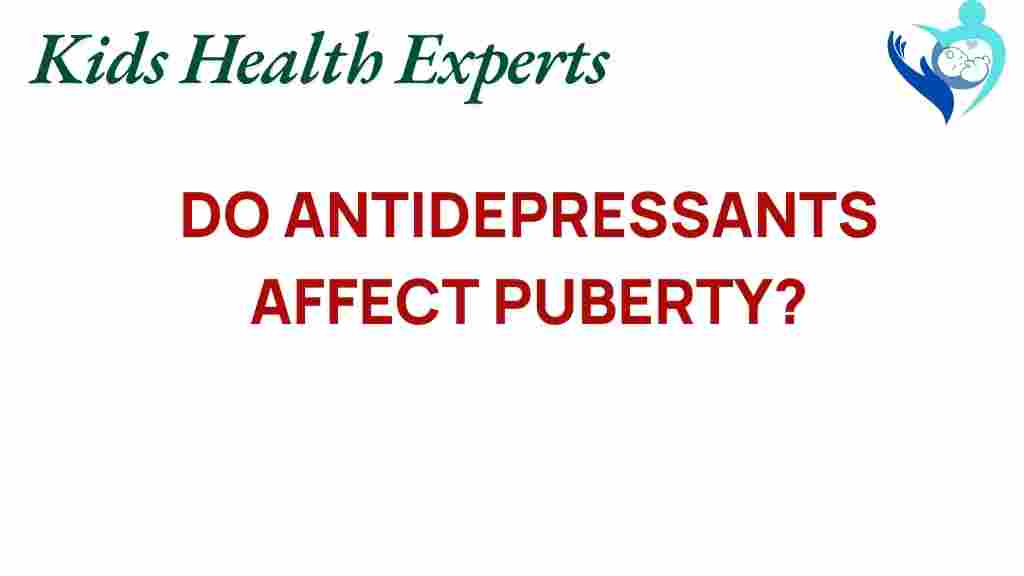Do Antidepressants Influence Puberty’s Pathway?
Puberty is a critical period in adolescent development, marked by significant physical, emotional, and psychological changes. During this time, many young people face mental health challenges, leading to increased prescriptions of antidepressants. This article explores the relationship between antidepressants, puberty, and overall youth well-being, examining the potential effects of medication on hormonal changes and psychological impact during this transformative phase.
Understanding Puberty and Its Challenges
Puberty typically occurs between ages 10 and 14 for girls and 12 and 16 for boys, although it can start earlier or later. This period is characterized by:
- Rapid physical growth
- Development of secondary sexual characteristics
- Emotional fluctuations and increased risk for mental health issues
As adolescents navigate these changes, they may experience heightened feelings of anxiety, depression, and stress. It’s crucial to understand how external factors, such as medication effects, can influence their development.
Antidepressants: What Are They?
Antidepressants are medications commonly prescribed to treat depression and anxiety disorders. They work by altering the balance of neurotransmitters in the brain, which can help improve mood and emotional stability. For adolescents dealing with severe mental health issues, these medications can be vital for recovery.
Common types of antidepressants include:
- Selective serotonin reuptake inhibitors (SSRIs)
- Serotonin-norepinephrine reuptake inhibitors (SNRIs)
- Tricyclic antidepressants (TCAs)
- Monoamine oxidase inhibitors (MAOIs)
The Role of Antidepressants in Adolescent Development
Research on how antidepressants affect puberty is still evolving. However, some studies suggest that these medications can have various effects on hormonal changes and emotional development:
- Hormonal Changes: Some studies indicate that antidepressants may influence hormone levels, which could potentially affect the timing of puberty.
- Psychological Impact: While these medications can alleviate depressive symptoms, they may also lead to side effects that impact emotional well-being.
- Medication Effects: The effectiveness of antidepressants can vary widely among adolescents, with some experiencing significant improvement while others may not respond as well.
How Antidepressants Affect Hormonal Changes
The relationship between antidepressants and hormonal changes during puberty is complex. Here are some key points:
- Serotonin and Hormones: Serotonin, a neurotransmitter affected by antidepressants, may play a role in regulating hormones related to growth and sexual maturation.
- Delayed Puberty: There is some concern that certain antidepressants could delay the onset of puberty due to their influence on hormonal signaling.
- Estrogen and Testosterone: Antidepressants can potentially alter the levels of estrogen and testosterone, which are crucial for the development of secondary sexual characteristics.
Psychological Impact of Antidepressant Use
The psychological impact of using antidepressants during puberty can be significant. Here are some considerations:
- Improved Mood: For many adolescents, antidepressants can lead to improved mood and functioning, allowing them to engage more fully in their developmental tasks.
- Side Effects: Some adolescents may experience side effects such as weight gain, fatigue, or emotional blunting, which can affect their self-esteem and social interactions.
- Dependency Concerns: There are concerns about long-term dependency on medication and the implications it may have on coping strategies during this critical developmental phase.
For parents and guardians considering antidepressants for their adolescent children, it’s essential to follow a thoughtful process:
- Consult a Mental Health Professional: Begin with a comprehensive evaluation by a psychiatrist or psychologist who specializes in adolescent mental health.
- Discuss Treatment Options: Consider all treatment options, including therapy, lifestyle changes, and medication.
- Monitor Progress: If antidepressants are prescribed, regular follow-ups are crucial to monitor their effects on mood and development.
- Communicate Openly: Maintain open lines of communication with your adolescent about their feelings and experiences while on medication.
- Assess the Need for Adjustments: Be prepared to adjust the treatment plan as necessary based on the adolescent’s response.
Troubleshooting Tips for Parents and Guardians
Managing an adolescent’s mental health can be challenging, especially when antidepressants are involved. Here are some troubleshooting tips:
- Educate Yourself: Understand the types of antidepressants prescribed and their potential effects on your child.
- Watch for Side Effects: Be vigilant for any side effects that may arise and communicate these to the prescribing doctor.
- Encourage Healthy Habits: Promote a balanced diet, regular exercise, and adequate sleep to support overall mental health.
- Seek Support: Consider joining support groups for parents of adolescents dealing with mental health issues.
Conclusion: The Importance of Balanced Approaches
The influence of antidepressants on puberty’s pathway is a topic that warrants careful consideration. While these medications can play a vital role in enhancing mental health and emotional well-being during a tumultuous developmental phase, it is essential to be aware of their potential effects on hormonal changes and psychological outcomes.
Parents, guardians, and healthcare professionals must work together to create a balanced approach that prioritizes both mental health and healthy adolescent development. By doing so, we can help ensure that our youth not only survive but thrive during this critical period of growth.
For more information on youth mental health and treatment options, check out this external resource on youth mental health.
For insights on managing adolescent mental health challenges, consider visiting our page on supporting youth well-being.
This article is in the category Mental and created by KidsHealthExperts Team
